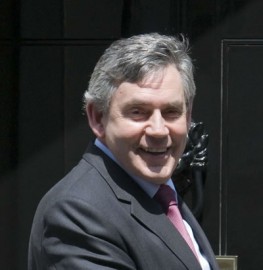
The Conservatives have proposed that anyone who takes over as prime minister during a parliament should be required to call a general election within six months. (Read a report on this proposal here.)
Obviously, this is a gibe at Gordon Brown, who after succeeding Tony Blair considered holding a general election in the autumn of 2007 but decided against it. He has suffered since then from the twin complaints that he is indecisive and that he lacks a mandate of his own.
Mysteriously, this Conservative proposal is missing from their manifesto (which you can read here). Why have they dreamt it up now? I think they are also concerned about the possibility of a coalition government being formed after the election between Labour and the Liberal Democrats, whose leader would be a Labour figure other than Gordon Brown – his resignation would be required by the Liberal Democrats as part of the deal. By insisting that Gordon Brown is the only possible Labour prime minister after the election, they are trying to make it harder for Labour and the Liberal Democrats to do a deal.
And they’ve got a point. After all the fuss and attention paid towards the three televised prime ministerial debates, it would be rather odd if the prime minister turned out to be someone who hadn’t even taken part. But this proposal also causes problems.
This website is dedicated to the idea of the dispersal of power. Federal systems distribute political power between different levels of government to ensure that the best interests of the citizen are upheld. The new Conservative proposal is a substantial measure of centralisation, and should thus be approached with caution.
It is a centralising measure in that it concentrates more power in the hands of the prime minister and correspondingly less in the House of Commons. A future prime minister will be protected against possible insurrection among his or her own backbenchers by the prospect of a general election held rapidly after any change of leader. The public do not normally take kindly to unnecessary elections, and a party that was moved to replace its leader would be likely to be trailing in the polls already. Against a background of complaints that British politics is becoming increasingly presidential, this Conservative proposal (and how that upper case letter is needed) would make it even more so.
There is a good argument to be made, though, that the balance of power between executive and legislature is less important than the balance of power between politicians and the people. That former balance has already been tipped somewhat by the innovation of televised prime ministerial debates in the first place (no voter is ever presented with the actual choice between Messrs Brown, Cameron and Clegg) and the Conservative proposal is simply adjusting the latter accordingly in order to catch up.
Experience suggests that parliamentary systems of government tend to be better at resisting centralisation than presidential systems. However, the modern media wants quick and direct answers to questions and wants to personalise decisions that are taken. This trend is true in business as much as in politics. If democracy is to survive in the modern era, it has to adapt to the expectations of the media, and maybe steps towards presidentialism are part of the price that has to be paid.
